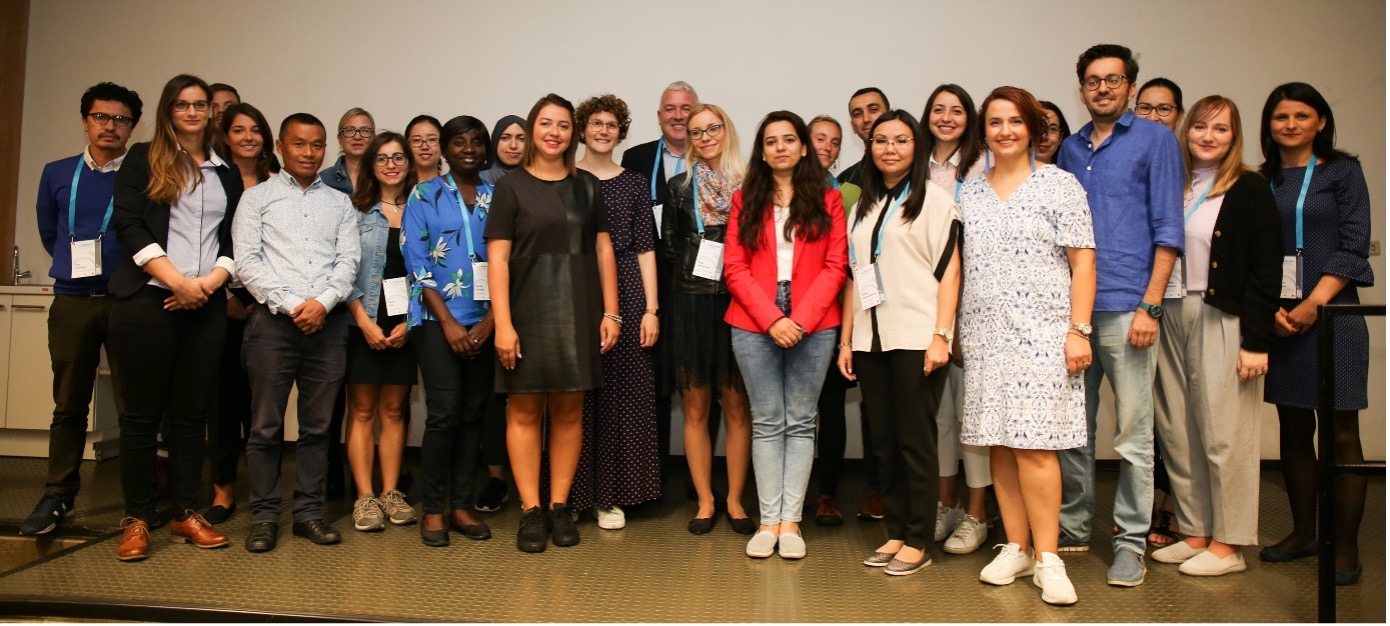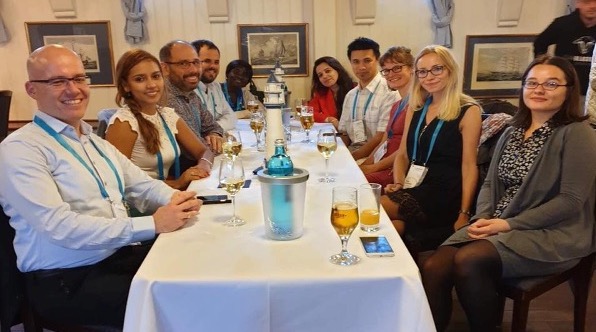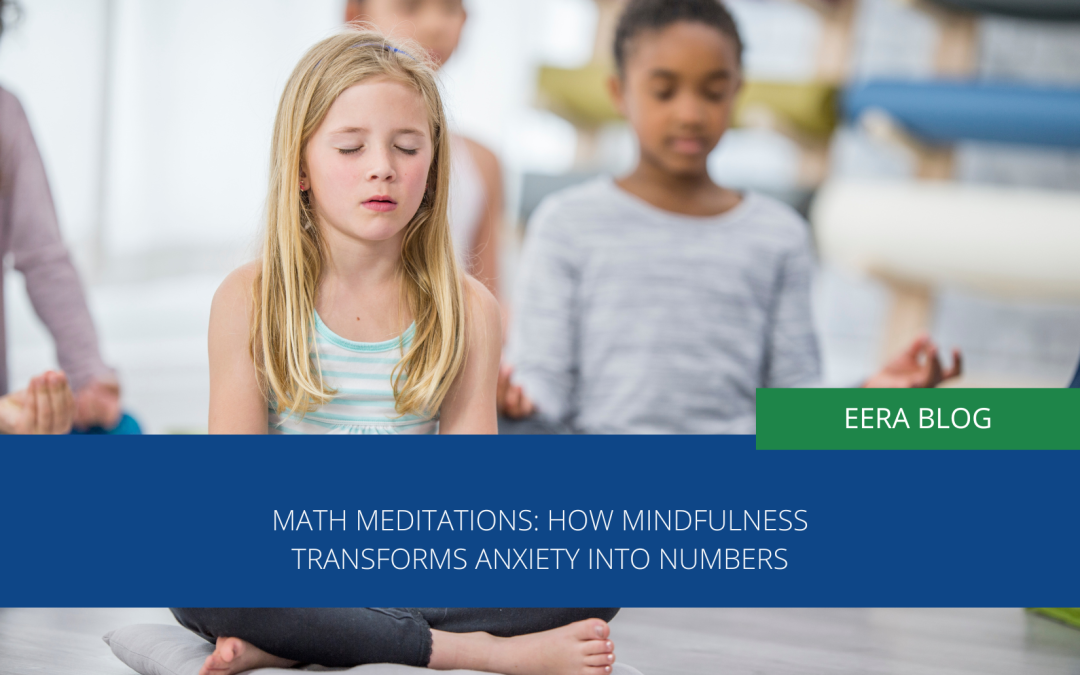
Math meditation – how mindfulness transforms anxiety into numbers
Even though mathematics is often considered the queen of sciences and one of the most important subjects taught in school, it remains a mystery to many people and is associated with fear—often passed down to children by parents, guardians, teachers, and social and cultural influences. Many educators, who play a crucial role in nurturing talents and supporting the development of mathematical skills, may benefit from additional training and resources on this topic.
The myth of mathematical talent as an innate gift
The belief that mathematical talent is both rare and inherited is a widespread cultural myth. Many still assume that success in mathematics requires a special, innate “gift” that cannot be learned or developed through effort alone. Research has shown that people often associate math achievement with brilliance, and this perceived brilliance is commonly thought to be genetically determined. For instance, surveys of both academics and the general public reveal a tendency to view math as a subject where innate talent plays a larger role than effort or teaching. (E. Chestnut, R. Ley, S. Leslie, A. Cimpian 2018; Science Daily, 2020).
Genetic studies suggest some link between brain development and mathematical ability, though the extent of the influence of heredity remains complex. For example, research on the neurobiological origins of mathematical ability highlights how certain genetic factors affect brain structures associated with quantity processing, influencing mathematical skills in children (M. Skeide et. Al, 2020).
This view, however, has important social implications, as it perpetuates stereotypes that brilliance—and thus success in mathematics—is more common among certain groups (such as males or people of specific racial backgrounds) while discouraging others from pursuing math-intensive fields (E. Chestnut, R. Ley, S. Leslie, A. Cimpian, 2018).
In my homeland, Poland, we recognize a great need to change the way mathematics is taught, starting from the earliest educational stages (StrefaEdukacji 2024). Unfortunately, this cannot happen immediately. It requires a lot of time, effort, and willingness to meet such a difficult challenge.
Could mindfulness help alleviate maths anxiety?
My academic interests are related to early childhood education in mathematics and language. During my work in primary schools, with students, and while conducting research projects, I noticed that the fear that often accompanies mathematics can be mitigated. Completing a psychotherapy course and having my own experiences with mindfulness led me to realize that this could be an important point in alleviating mathematical anxiety. As it later turned out, I was not the only one who thought this way.
The United Kingdom was one of the first countries to widely introduce mindfulness into schools. Mindfulness programs began to be implemented on a larger scale in 2019 as part of an initiative aimed at improving students’ mental health. This project, carried out by the Anna Freud National Centre for Children and Families in collaboration with University College London, involved around 370 schools in England. As part of the initiative, students participated in mindfulness exercises, relaxation techniques, and breathing exercises to improve their mental well-being (Chen, C. ,2021,Weare, K., & Bethune, A.,2021).
Research on the impact of mindfulness on mathematics performance in schools has yielded promising results. One study conducted on primary school students in the United Kingdom found that mindfulness interventions can help reduce mathematics anxiety, which in turn can improve mathematics performance. Students who regularly practiced mindfulness before math lessons reported lower levels of anxiety and better results in math tests. However, the effectiveness of these interventions varied depending on the school and its approach to implementing the program (Henderson, D., 2019).
Other studies on secondary school students indicate a positive impact of mindfulness on high-stakes mathematics test performance. Specifically, students who participated in mindfulness sessions before tests achieved better results than their peers who did not have such an intervention. Mindfulness helped them reduce stress and anxiety related to testing, which positively influenced their achievements (Zuo, H., & Wang, L. (2023)).
It is worth noting, however, that although research indicates the benefits of mindfulness in mathematics education, the effectiveness of these programs can depend on various factors, such as the implementation method and individual differences among students. Therefore, further research is necessary to better understand how and why mindfulness affects mathematics performance (Meyer, L., & Eklund, K. (2020).
Traditional Teaching of Mathematics
Mathematics is often taught in a highly structured way, prioritizing memorization and practice of specific techniques. This conventional method is teacher-centered and results-driven, emphasizing accuracy and speed. Many students experience math anxiety due to the pressure of getting correct answers quickly, which can make learning rigid and stressful. Mistakes are typically viewed as failures rather than opportunities for learning, contributing to a fear-based relationship with the subject. (Boaler, J., 2016).
Traditional math teaching often emphasizes heavy focus on formulas and algorithms, requiring students to memorize and apply them in repetitive ways. This approach places a strong emphasis on performance, especially through tests and exams, where students are judged primarily on their ability to get the right answer quickly. Instruction tends to be teacher-centered, allowing little room for exploration or curiosity, as students follow strict procedures rather than engaging in creative problem-solving. Mistakes are often seen as failures rather than opportunities for growth, which can lead to increased anxiety among students. As a result, this method of teaching tends to disconnect learners from emotional or mindful engagement, reducing their ability to connect with the material on a deeper level.
Teaching Mathematics with Mindfulness
In teaching mathematics with mindfulness, there is a strong encouragement of self-reflection and mindfulness exercises aimed at reducing student anxiety. Mistakes are normalized, promoting a learning process that embraces trial and error rather than fear of failure. The focus shifts from memorizing formulas to understanding concepts deeply, ensuring that students grasp the “why” behind the methods they use. Real-world applications of math concepts are highlighted to make the subject more engaging and relevant. Additionally, collaborative learning environments are fostered, supporting cooperative problem-solving and peer interaction, which enhances both understanding and enjoyment of the subject (Leppma, M., & Darrah, M., 2022).
Studies suggest that incorporating mindfulness practices in math classrooms can significantly reduce anxiety and improve problem-solving skills by helping students focus on the present moment and engage with math in a more open, less judgmental way (Ahmed, K., Trager, B., Rodwell, M., Foinding, L., & Lopez, C., 2017).). This approach aligns well with contemporary educational goals that prioritize not just cognitive, but emotional and social development.
Summary – and a call for change in teaching mathematics in Poland
In my opinion, considering the needs of Polish children, we should implement similar initiatives in our country. The experiences in the United Kingdom clearly demonstrate that mindfulness in education can help students. Introducing mindfulness programs in schools, especially amidst the current mental health crisis among children and adolescents, can serve as a powerful tool for fostering mental health hygiene and prevention.
By adopting these practices, we can help Polish youth not only academically but also develop the resilience and well-being needed to thrive in all aspects of their lives. And as mindfulness has no cultural boundaries, such assistance should, in my opinion, be a right for every student attending school in every country in our world.
Key Messages
- Mindfulness reduces math anxiety by shifting focus to the present moment.
- Embracing mistakes as part of the learning process improves problem-solving skills.
- Mindful approaches foster a deeper understanding of mathematical concepts.
- Mindfulness improves concentration, leading to better performance in math.
- Math meditation enhances emotional and cognitive development.
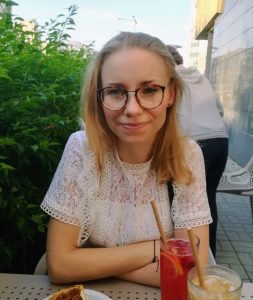
Dr Maja Wenderlich
Assistant Professor in the Department of Supporting Human Development and Education, The Maria Grzegorzewska University, Warsaw, Poland
Profile in ResearchGate: https://www.researchgate.net/profile/Maja-Wenderlich
Academia edu: https://aps-pl.academia.edu/MajaWenderlich?from_navbar=true
University Profile: http://www.aps.edu.pl/instytuty/instytut-wspomagania-rozwoju-cz%C5%82owieka-i-edukacji/zesp%C3%B3%C5%82/wenderlich-maja/
Other blog posts on similar topics:
Ahmed, K., Trager, B., Rodwell, M., Foinding, L., & Lopez, C. (2017). A review of mindfulness research related to alleviating math and science anxiety. Journal for Leadership and Instruction, 16(2), 26–30. https://spiral.lynn.edu/facpubs/434/
Bennett, D. (2019). Mindfulness and math: The role of mindfulness in mathematics education and assessment. Large-scale Assessments in Education, 7(1), 1-14. https://doi.org/10.1186/s40536-019-0078-1
Boaler, J. (2016). Mathematical mindsets: Unleashing students’ potential through creative math, inspiring messages and innovative teaching. San Francisco, CA: Jossey-Bass.
Ernest, P. (1989). The philosophy of mathematics education. London, England: Falmer Press. 2016-07883-000
Chen, C. (2021). Exploring mindfulness-based school programs around the world. Centre for Education Improvement. https://www.edimprovement.org/post/exploring-mindfulness-based-school-programs-around-the-world
Chestnut, E., Ley, R., Leslie, S., Cimpian, A. (2018). The Myth That Only Brilliant People Are Good at Math and Its Implications for Diversity. Education sciences, 8(2), 65. https://doi.org/10.3390/educsci8020065
Henderson, D. (2019). Exploring the impact of a mindfulness-based intervention in relation to primary school children’s mathematics anxiety [Doctorate of Educational Psychology in Educational Child and Community Psychology]. University of Exeter. https://ore.exeter.ac.uk/repository/handle/10871/38965
Leppma, M., & Darrah, M. (2022). Self-efficacy, mindfulness, and self-compassion as predictors of math anxiety in undergraduate students. International Journal of Mathematical Education in Science and Technology, 1–16. https://par.nsf.gov/biblio/10327283-self-efficacy-mindfulness-self-compassion-predictors-math-anxiety-undergraduate-students
Meyer, L., & Eklund, K. (2020). The impact of a mindfulness intervention on elementary classroom climate and student and teacher mindfulness: A pilot study. Mindfulness, 11, 991-1005. https://doi.org/10.1007/s12671-020-01317-6
Neuroscience News. (2020, October 28). Genetics linked to children’s math ability. Neuroscience News. https://neurosciencenews.com/genetics-math-ability-17207/
Rodríguez, S., Regueiro, B., Piñeiro, I., Estévez, I., & Valle, A. (2020). Gender differences in mathematics motivation: Differential effects on performance in primary education. Frontiers in Psychology, 10, Article 3050. https://doi.org/10.3389/fpsyg.2019.03050
ScienceDaily. (2020, October 22). Mindfulness training in schools reduces stress and improves mental health. ScienceDaily. https://www.sciencedaily.com/releases/2020/10/201022144549.htm
StrefaEdukacji. (2023, September 4). Wiceminister edukacji Katarzyna Lubnauer zapowiada zmiany w nauczaniu matematyki. Strefa Edukacji. https://strefaedukacji.pl/wiceminister-edukacji-katarzyna-lubnauer-zapowiada-zmiany-w-nauczaniu-matematyki-szkoly-czeka-kolejna-rewolucja/ar/c5-18385069
Weare, K., & Bethune, A. (2021). Implementing mindfulness in schools: An evidence-based guide. The Mindfulness Initiative. https://mindfulnessinschools.org/wp-content/uploads/2021/03/implementingmindfulnessinschools-vfinal-digital.pdf#:~:text=URL%3A%20https%3A%2F%2Fmindfulnessinschools.org%2Fwp
Zuo, H., & Wang, L. (2023). The influences of mindfulness on high-stakes mathematics test achievement of middle school students. Frontiers in Psychology, 14. https://www.frontiersin.org/articles/10.3389/fpsyg.2023.1061027/full

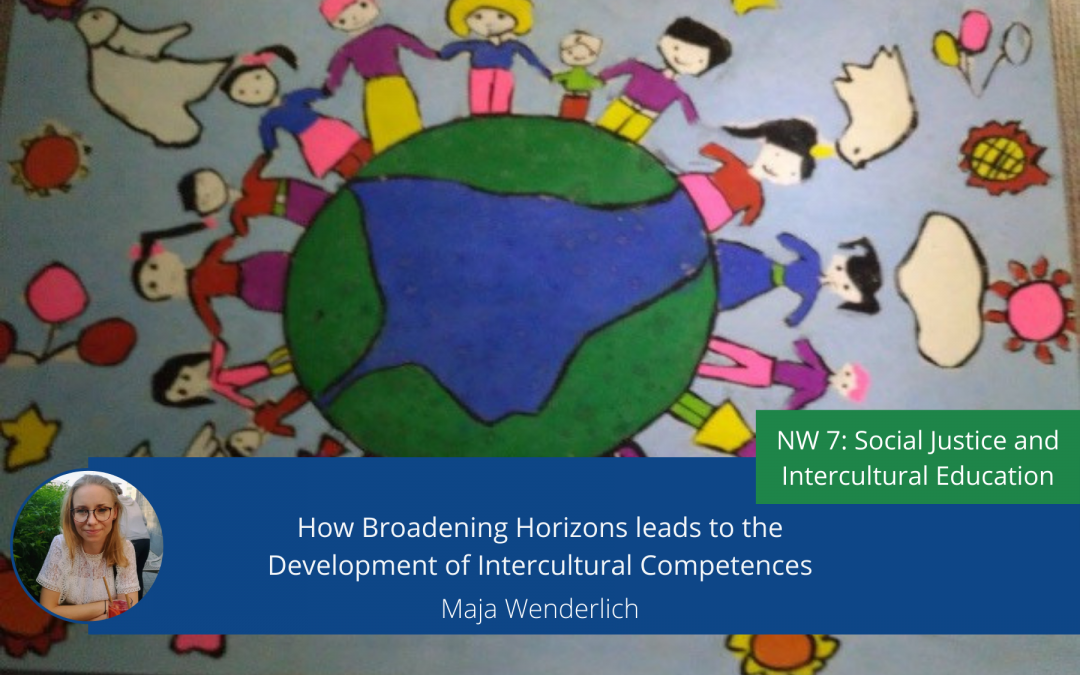


 The stay in Denmark exceeded my expectations. I cooperated with scientists from all over the world in meetings, seminars, conferences and workshops, which provided a lot of inspiration. At that time, I also had the opportunity to communicate in English on a higher level than before. I met people not only from Europe but also from South America, Asia and the United States. Every Wednesday, a ‘kitchen seminar’ was organized. That was the name of the meetings of scientists from around the world where we discussed one given topic every day.
The stay in Denmark exceeded my expectations. I cooperated with scientists from all over the world in meetings, seminars, conferences and workshops, which provided a lot of inspiration. At that time, I also had the opportunity to communicate in English on a higher level than before. I met people not only from Europe but also from South America, Asia and the United States. Every Wednesday, a ‘kitchen seminar’ was organized. That was the name of the meetings of scientists from around the world where we discussed one given topic every day.